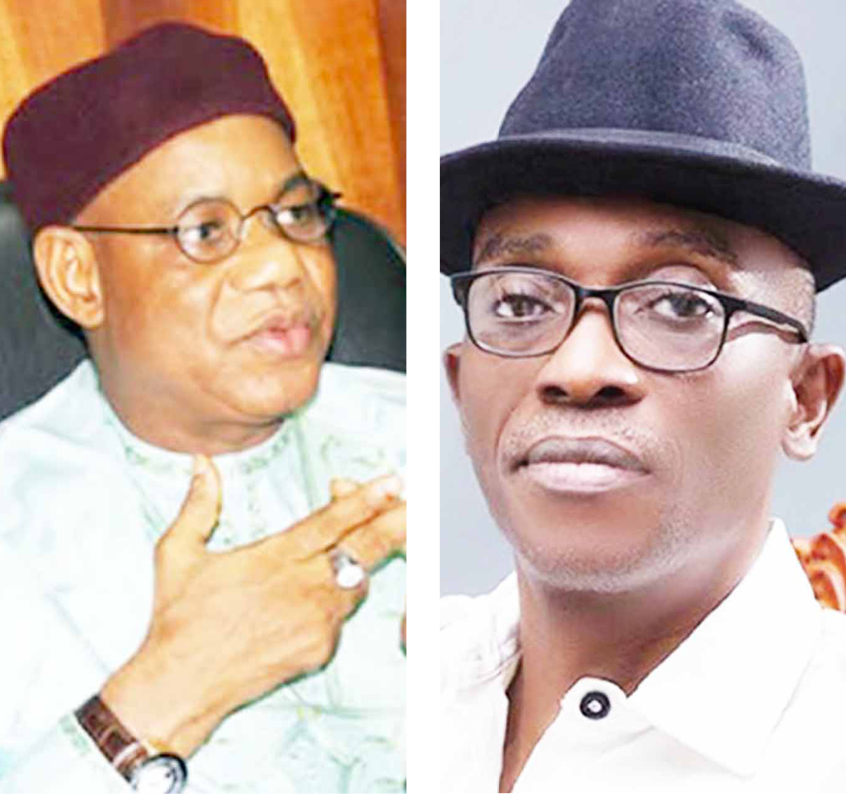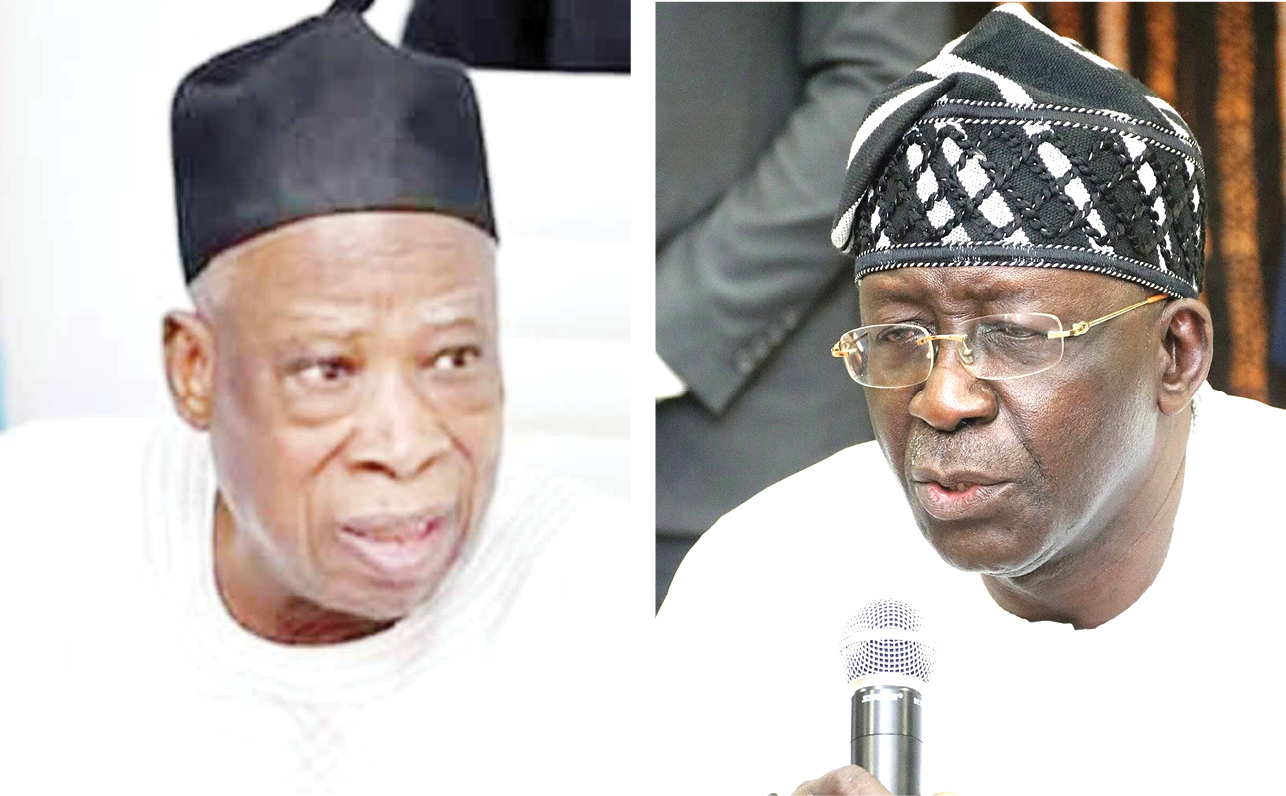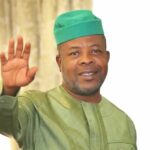In the aftermath of the 2023 general elections, major political parties in the country are entangled in a web of post-election crises, Daily Trust on Sunday reports.
Despite its victory in the just concluded general elections, the ruling All Progressives Congress (APC) is enmeshed in an internal crisis.
The party won the presidency and governorship in more states, even as it secured majority seats in the National Assembly.
But as it basks in the euphoria of victory, divisions within seem to be threatening its foundation.
Daily Trust on Sunday reports that the party’s National Working Committee (NWC) members are working at cross-purposes, thus, igniting a crisis of interest and tearing the party apart.
Some NWC members and groups within the party are said to be uncomfortable with the leadership style of the APC national chairman, Senator Abdullahi Adamu; hence the calls for his resignation.
There were reports on the social media a few days ago that the APC helmsman had thrown in the towel, but when contacted, the party’s national publicity secretary, Felix Morka, a lawyer, said it was untrue.
Also, a few weeks after the February 25 presidential election, the national vice chairman (North-West) of the APC, Salihu Mohammed Lukman, called for Adamu’s resignation.
He said Adamu should resign for a Christian to take over the office of national chairman to enable Christians have a sense of belonging in the polity.
He said, “Now that the election is won by Tinubu, it is important to demonstrate that the Muslim-Muslim ticket of the president-elect and Shettima is simply an electoral strategy.
“With a national chairman, Senator Abdullahi Adamu, who is also a Muslim, it will be important that every necessary step is taken to inject a change of leadership for the party so that a new national chairman who is a Christian takes over.
“Part of the advantage of this is that the national chairman could be retained in the North-Central. There should be no difficulty in convincing Senator Adamu to resign for a Christian to emerge.”
Similarly, a coalition of civil society organisations, under the aegis of the Conference of Nigeria Civil Rights Activists, asked Adamu to obey the calls for his resignation in the interest of equity, fairness and justice.
Daily Trust on Sunday reports that Lukman had, while featuring on an AIT programme recently, accused the APC national secretary, Senator Iyiola Omisore, who is also a member of the NWC, of mismanaging funds allocated for last year’s Osun governorship campaign and allegedly causing the APC defeat in the election.
He equally accused the party’s national secretary of further dividing the Osun State chapter of the party, and called for his resignation.
But Omisore, in a letter to Lukman through his Lawyer, Gboyega Oyewole, a Senior Advocate of Nigeria (SAN), asked the party’s vice chairman to retract the statement against him in two national dailies and several online media platforms and pay him N500million for alleged defamation of character within 48 hours or face legal action.
A defiant Lukman, however, refused to retract the statement, saying he was ready for Omisore.
“I stand by my position that Omisore is unable to unite party leaders and members in Osun State, which is responsible for why we lost the election. He is opposed to any demand for accountability and is resorting to acts of intimidation to perhaps manipulate processes of appointment into the Asiwaju-led federal government,” he said.
Crises in states over anti-party activities
The aftermath of the general elections has equally thrown the ruling party into bedlam, culminating in the sack or suspension of officials and stalwarts in some states.
Some members of the State Working Committee have been suspended, while others have been sacked over alleged anti-party activities.
Various committees set up by the party in states had recommended disciplinary actions against some prominent members who allegedly worked either for the PDP candidates or those of the Labour Party (LP).
For instance, the APC in Enugu had reportedly suspended Geoffrey Onyeama, minister of foreign affairs and Ken Nnamani, former Senate president, from the party.
The party also expelled Sullivan Chime, a former governor; Eugene Odoh, a former Speaker of the state assembly, Osita Okechukwu, director-general of the Voice of Nigeria (VON), among others, over alleged anti-party activities.
Speaking with newsmen after the party’s Executive Council meeting, Robert Ngwu, the secretary of the APC, said anti-party activities undermined its ability to fulfill its role, and harm the functioning of democracy.

But Okechukwu and others dismissed claims of being suspended.
Also, the Bauchi State chapter of the APC had suspended its chairman, Alhaji Babayo Aliyu Misau, for allegedly not voting for the party’s governorship candidate in the election.
Misau was accused of engaging in anti-party activities before and during the election in a way that undermined the success of the party at the polls.
In the same vein, a former media aide to President Buhari and chairman of the Board of the Niger Delta Development Commission (NDDC), Lauretta Onochie, was suspended by the leadership of the APC in her Onicha-Olona ward 4 of Delta State.
A resolution of the ward leadership signed by Ogbolu Peter Nduka and Justina Amagor Akaeze (chairman and secretary) along with 25 other members of the ward committee in Aniocha North Local Government Area accused her of anti-party activities.
Some members of the Rivers State Executive Committee of the APC also suspended its chairman, Emeka Beke, legal adviser and Iheanyichukwu Azubuike, over alleged anti-party activities in the February 25 presidential election.
But Beke said executive members had no power to suspend him, alleging that the development was a continuous onslaught by the Peoples Democratic Party (PDP) in the state against the party.
The APC in Niger State had also suspended the state chairman, Haliru Zakari Jikantoro, over alleged anti-party activities during the elections.
The Kashini ward executives of the party in Agwara Local Government Area suspended Jikantoro, accusing him of violating the party’s constitution and causing crisis ahead of governorship and state assembly polls.
Also, a chieftain of the APC in Edo State, General Charles Arhiavbere (retd), was suspended for alleged anti-party activities. His suspension was announced in a statement jointly signed by Felix Ehigiegba and Edward Oviawe (chairman and secretary) of Oredo ward 1 respectively, and 20 others, and addressed to the party hierarchy.
PDP’s unending crisis
Many had thought the crisis that engulfed the main opposition PDP immediately after its presidential primary in May last year would come to an end following the party’s defeat at the polls, but that was not to be, as the impasse not only festered but also increased in intensity, leading to the sack of the national chairman, Dr Iyorchia Ayu.
Although the case instituted against him is still in court, party stakeholders feel that Ayu is already out of the party as the forces against him are working to make sure that the Benue-born politician and former president of the Senate does not return to Wadata Plaza.
Apart from the pre-election imbroglio, Ayu seems to have underestimated the forces against him when, immediately after the conclusion of the polls, he descended on some party leaders with suspension for alleged anti-party activities and other issues.
Among those that came under the hammer of Ayu were former governors Ibrahim Shema (Katsina State), Ayodele Fayose (Ekiti State), former Senate president, Pius Anyim (Ebonyi State), Prof Dennis Ityavyar (Benue State) and Dr Aslam Aliyu (Zamfara State).
Samuel Ortom, Ayu’s home state governor, also did not escape the onslaught as he was referred to appear before the National Disciplinary Committee of the party.
Daily Trust on Sunday gathered that the suspension was almost a unilateral decision following efforts by some members of the National Working Committee to intervene.
Ayu was said to have insisted and used his veto power to push through the suspension.
A source told Daily Trust on Sunday that it was because of the development that it became easy to rescind the suspension when Ayu was sacked.
To compound the woes of Ayu and the crisis in the party, ward executives in his Igyorov ward of Gboko Local Government Area of Benue decided to suspend Ayu over issues bordering on the conduct of the last elections.
Addressing a press conference on the issue, Mr Vangeryina Dooyum, the secretary of Igyorov ward, who stood in for the chairman said, “We observed with utmost dismay that Dr Iyorchia Ayu, who is the national chairman of the PDP worked against the success of the party in Igyorov council ward.”
The suspension was followed by a court action stopping the suspended Ayu from parading himself as the chairman of the party.
Labour Party on edge
Despite its impressive showing in the just concluded 2023 general elections, the leadership of the Labour Party (LP) has been entrenched in a leadership crisis that is tearing the party and its electoral fortune apart.
The gale of suspension and counter-suspension peaked with a Federal Capital Territory (FCT) High Court, restraining the embattled Julius Abure from parading himself as the national chairman of the LP.
He was restrained alongside three officials, over alleged forgery.
The presiding judge, Justice Hamza Muazu, also ordered that the originating processes of the court be served on the restrained officials, being Abure, the national secretary, Umar Farouk Ibrahim; national treasurer, Oluchi Opara, and the national organising secretary, Clement Ojukwu.
The judge held that the ex parte application for an interim injunction restraining the four officials by aggrieved members of the party before the court had merit and granted the same.
At a press conference, Martins Osigbemhe, the ward chairman, said Abure was suspended by the executive pending the determination of the numerous petitions and cases against him in courts.
But the national secretary of the party, Mallam Farouk Umar, dismissed the suspension, describing it as illegal.
He said the party’s constitution was clear on who could suspend its national chairman.
However, the same day, as the Abuja court ordered Abure to stop parading himself as the national chairman of the party, alongside three others, a High Court in Benin City, the Edo State capital, restrained the party from executing the purported suspension of the national chairman, Julius Abure, till the determination of a motion on notice.
In a suit filed by Abure and three others against the LP, they asked the court to restrain the party from acting or executing and implementing the purported notice of suspension issued by first and second defendants over the subject matter pending the determination of the motion on notice.
The crisis culminated in to show of force by the two opposing camps, leading to pandemonium when some state chairmen of the party chased the Lamidi Apapa-led faction of the National Working Committee away from the national headquarters of the party in Abuja.
The group, made up of seven members of the NWC, installed the national vice chairman (South), Lamidi Bashir Apapa, as the acting chairman following the suspension of Abure.
They said they were acting on the judgement of the Federal Capital Territory (FCT) High Court, which restrained Abure from parading himself as the national chairman of the party.
Penultimate Friday, over 30 state chairmen forced their way into the party’s headquarters, insisting that Abure remained their leader.
But speaking to newsmen on Wednesday in front of the office gate, the chairman of LP in Kwara State and chairman of all the state chairmen of the party, Chief Kehinde Rotimi, said he and his colleagues had arrived for a meeting but were locked out of the secretariat, and that when the Apapa-led faction arrived, they (the state chairmen) also refused to let them in, forcing everyone to remain outside.
Reacting to the incident, LP’s former youth leader, Anslem Eragbe, who was suspended by the NWC, said they were merely acting on the party’s constitution, lamenting the bad treatment given to the interim national chairperson Apapa by the state chairmen.
While the LP presidential candidate, Peter Obi, has not said anything publicly about the crisis in the party, many political commentators believe that if nothing urgent is done its foundation would be threatened.
NNPP chairman’s resignation
The erstwhile national chairman of the New Nigeria Peoples Party (NNPP), Prof Rufai Alkali, stepped aside in late March, barely two weeks after the governorship election in which the party won Kano State.
Although there are insinuations that there’s crisis in the party, which prompted Alkali’s resignation, the party hierarchy has maintained that his action was in good faith.
The acting chairman of the party, Alhaji Abba Kawu Ali, while speaking with journalists in Abuja recently, thanked Prof Alkali for superintending over the success of the party at the governorship election, saying, “We are not going to forget him for his contributions, nobody is going to take this away from him.”
He insisted that there was no hidden reason for Alkali’s resignation, saying he stepped aside to allow younger Nigerians take up the leadership of the party and move it forward.
Daily Trust on Sunday, however, gathered from a source in the party that Alkali’s resignation might have been influenced by the general feeling that NNPP underperformed in the general elections.
The source, who declined to elaborate on the issue, said the party did not meet its expectations in the presidential and National Assembly elections of February 25, as well as the governorship and state houses of assembly elections held on March 18.
A letter which Alkali personally signed and addressed to the national secretary of the party, Dipo Olayioku, reads, “I am pleased to write and convey to you that I have stepped aside as the national chairman of the New Nigeria Peoples Party with effect from March 31, 2023.
Why parties are engulfed in crises – Analysts
Speaking on the development, the director of the Abuja School of Social and Political Thoughts, Dr Sam Amadi, said the crises rocking major political parties were a reflection of the Nigerian democracy, adding that many people do not understand the logic of democracy.
He said, “The basic character of our politics is banditry. Like bandits, they rely on superior force. Bandits are opportunists, they do not work for collective good. Like bandits, our politicians use violence, at times to disrupt the political process.
“There are processes when you elect people, but a banditry approach will not look at any process, they deliberately break the law to remove people from office. They don’t understand that they are constrained by law.”
He, however, said the way out was to know that democracy is not all about elections alone, but also how to institutionalise the rule of law.
Also speaking, a lecturer in the University of Abuja, Prof Kari Abubakar Umar, enumerated reasons for post-election crises in political parties.
Kari, in a telephone chat, said anti-party activities, loss of elections by political parties and the tendency to get scapegoats for defeat, among others, trigger post-election crises in political parties.
He said, “One of the dominant features of political parties in this republic is an unending intra-party crisis. The parties are characterised by serious crises in the first place, probably because most of them, if not all, are a collection of strange bedfellows who share nothing in common but congregate under the same party.
“The common denominator is interest. They want to use the party as a platform; that is why any little matter always sparks crises.
“There are specific periods that political parties experience crises, and the aftermath of elections is one of them. Other periods include when party officials are elected, the periods of primaries; and there are so many reasons for that.
“Perceived or real anti-party activities may be one of them; the way people conducted themselves from the beginning to the end of the election. Generally, the period following elections is characterised by intra-party crises.
“There is also the issue of the party losing out and members not being happy. So they are always going to make some people scapegoats for failure.
“Another major issue is that usually, the aftermath of elections provides the opportunity for different tendencies and factions within the party to want to take over the party; to want to dominate, like what is happening in the PDP now. Different interested parties want to take over the party and position themselves for the future.
“In the APC, some people are being accused of anti-party activities; so normally, there is the tendency to look for people to blame,” Kari said.
By Fidelis Mac-Leva, Saawua Terzungwe, Abbas Jimoh, Baba Martins & Terkula Igidi




